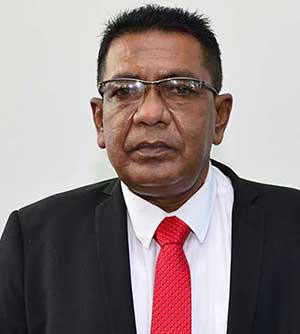–region’s food import bill could be cut by 25 per cent, President Ali says
GUYANA’s agriculture sector is on a transformative pathway, and can become the “agricultural heartland” of the English-speaking Caribbean, President Ifraan Ali said in his message on the commencement of Agriculture Month.
President Ali said that government envisions that Guyana will play its part in helping the Caribbean community to reduce its food import bill by 25 per cent by 2025.

“The envisaged transformation of the local agriculture sector will involve an inclusive approach, which will include the active participation of the government and the private sector, and continued engagements with farmers, agriculturalists, agronomists, veterinarians, food exporters, importers, academia, the scientific community and other stakeholders,” President Ali said.
He added: “Guyana’s agriculture sector is on a transformative pathway. An exciting future lies ahead; Agriculture Month 2021 is an opportunity for us to plan and prepare for the future.”
Meanwhile, Minister Mustapha, in his message, emphasised that Guyana cannot keep doing agriculture the way it has been done, and, therefore, must move to a more technologically advanced level.
“We need forward-thinking game-changing approaches for agri-food system transformation; we need to be more innovative to have a high uptake in technologies that will transform and modernize our food,” Mustapha said.
He commended those involved in the agriculture sector for their contributions in helping to build a strong and diverse Guyana. The minister noted that this year, due to the COVID-19 pandemic, many of the Agriculture Month activities will be held virtually, or in limited small gatherings during regional outreaches.
Observed annually during the month of October, Agriculture Month is used as an opportunity to look at the importance and pivotal role that Guyana’s agriculture sector plays in the economy and society. This year agriculture month is being celebrated under the theme, “Transforming our Food Systems: Achieving Food and Nutrition Security”.
“This theme is quite appropriate, given the dire need to change our agriculture and food system, so that it addresses the many food security challenges encountered due to the COVID-19 pandemic since March 2020, and then the unprecedented floods in May/June 2021,” Mustapha noted.
This month, Guyana will also be joining the United Nations Food and Agriculture Organisation in celebrating World Food Day on October 16. This event would be celebrated under the theme, “Our actions are our future. Better production, better nutrition, a better environment and a better life,” he said before outlining the ministry’s vision for the sector.
“Our vision for the agriculture sector is to have a competitive, dynamic, diversified and environmentally sustainable agri-food system by 2025. To achieve this vision, the agriculture and food systems sector in Guyana must be repositioned and transformed,” Mustapha said.
He noted that going forward, the ministry’s vision towards 2025 will be focusing on four priority areas which will be: To build a diversified and competitive agriculture sector, to address impacts of climate change with resilient infrastructure, increase access and satisfaction in agri-service delivery and to enable agri-businesses to access markets.
The minister also noted that the government and ministry is committed to building back our productive capacity from the May/June floods, which affected over 27,000 crops and livestock farmers, and households.
“Transforming the agri-food system will require significantly greater public financing as well as private capital from national, regional and international partners. International support, institutions, and bilateral partners will be critical to ensuring a more resilient agricultural sector through financing, technology and creating an enabling environment.”
He also noted that the government is committed to ensuring that the right solutions are implemented.
“The government will continue to work to ensure that Guyana’s agri-food system is resilient and sustainable and that we are not only food secure but that we continue to be a leader in agriculture matters and the food basket of the Caribbean,” he said.




.jpg)









